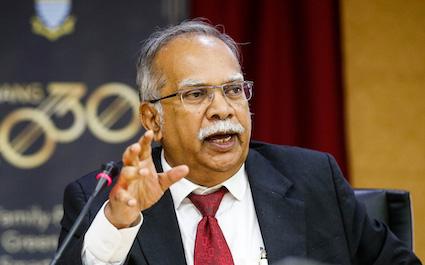BERSATU Youth chief Wan Ahmad Fayhsal Wan Ahmad Kamal thinks that just because secularism is incompatible with religious administration, there is a need to reject secularism especially among the Muslims.
This is based on the mistaken notion that there is only one view in the Islamic world about the need to reject secularism. However, even with Islam (and also other religions), secularism is subject to many different interpretations.
Religious scholars often interpret religious texts to explain or to make sense of the modern world.
Even within the Islamic world, there is a number of interpretations as to the relevance of secularism in the Islamic world. In this respect, secularism has been redefined away from the experience of the Western world.
Some outwardly reject secularism as something incompatible with Islam whereas others think that Islam needs not reject secularism.
The needs of secularism can be reconciled with religious texts.

In the non-Muslim world, even if secularism is the standard practice, there is a growing trend in some countries to incorporate religious practices in their administrations so much so that the line dividing between secularism and religion becomes blurred.
In India the rise of the Hindutva religious movement has sought to saffronise the state to some extent.
In this case, the Hinduism of Hindutva seeks to do away with the state administration that is based on secular principles.
It is not that secularism is just an anathema to Islam but also to the religions, especially religions that have been reinterpreted in the modern context.
Secularism is often associated with the rise of the Western modern states that sought to banish religion to the private realm.
For German philosopher Karl Marx, for example, it is not the religious state that was the problem but the state itself.
Given the uncertainty of the modern world, religion seems to be invoked more and more to deal with the unknown and the mysterious.
While theoretically clear lines can be drawn to distinguish between what is secular state and non-secular one, the real changing world remains complex.
The separation between the state and religion in the real world remains problematic.
Wan Fayhsal need not show his ignorance by just rejecting blindly the notion of secularism. He must engage in a discursive attempt to spell out the how religion and state have functioned in varying ways over centuries.
Whether one agrees with the notion of secularism or not is not important. However, they must be willing to accommodate the idea that there are many empirical shades to the combination between the state and religion. – Dec 15, 2022
Prof Ramasamy Palanisamy is the state assemblyperson for Perai. He is also deputy chief minister II of Penang.
The views expressed are solely of the author and do not necessarily reflect those of Focus Malaysia.
Main photo credit: KnowLaw.in










